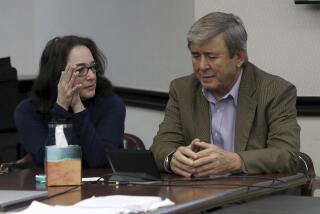Graduate Beats Medical Odds
- Share via
Both mother and son try not to dwell on what they could have done differently that November night 11 years ago when a .45-caliber bullet pierced his brain.
She might have disregarded that 104-vehicle freeway pileup near Coalinga the day before, which made her tell him to use surface streets coming home from the movies.
He might not have flooded his car’s engine as he tried to flee from bullets spraying through his rear window. And when the car stalled and the men following pulled him out, he might have thought of just the right words to satisfy them.
Instead, the pair focus on what Jaime has achieved--and will yet achieve--after nine years of classes through Santa Monica College’s program for students with acquired brain injuries.
Today, they have reason to celebrate: Against all medical predictions, Jaime will graduate from community college.
He was left for dead that November night, just a mile from his Inglewood home, after being shot point blank in his right cheek in a robbery. Then 18 and an aspiring policeman attending Harbor College, he spent the next six months in a coma and awoke unable to walk or talk.
The men involved in the shooting have never been caught. Out of fear that they will find him and retaliate, Jaime asked to be identified only by his middle name for this article.
Jaime, 29, still has a gentle baby face and thickly muscled legs left over from being a star baseball player at Carson High School. A deep hollow in his cheek and a scar hidden in his dark hair are the only signs of what he refers to as “the crime.”
“It’s hard to not think about something like this, but I would be a very sad person all the time if I let myself focus on something so horrible,” said Jaime, who lives with his mother. “Accepting that I was no longer able to do stuff for myself and that I had to depend on other people have been the hardest things.”
A sense of humor and his mother’s support brought Jaime through the roughest times, starting when he came home from the hospital and did nothing for hours but sit on a couch, staring straight ahead with his hands on his knees.
“I ... knew I had to push him to do something,” said his mother, Gabby. “I was not going to let a young guy stay home and allow being disabled to excuse him from living the rest of his life.”
Officials at Daniel Freeman Memorial Hospital in Inglewood, where Jaime was a patient during most of his coma, recommended he relearn life skills through the Santa Monica College program.
“When I started the program, graduating from college was the last thing on my mind,” Jaime said. “I just wanted to be at high school level.”
Created in the early 1980s, the program has about 60 students with brain injuries from motor vehicle accidents, tumors, strokes and falls, as well as gunshot victims like Jaime.
For most students, the first year includes learning strategies to compensate for their disabilities, as well as computer skills and physical education classes.
After two semesters, most students can start taking mainstream classes, although program coordinators work with professors so that allowances can be made--such as giving them more time on tests.
Jaime started the program in the summer of 1993 and had a hard first year, said Director Sandi Burnett.
“He had to approach education in a very, very different way than
For the first two years, Jaime’s mother drove him to and from Santa Monica, sometimes staying long enough to be sure he found his way to the next class. Now he takes buses and the light rail, both to college and to a Santa Monica elementary school where he tutors.
Although he has regained most of the skills he had before the shooting, Jaime said it takes him about five times as much work to learn as it did before. Because he can remember how easily things used to come to him, it is difficult sometimes for him to remember his deficits. Before each semester, his mother had to force him to drop some of the classes he’d signed up for while thinking he could work at his prior level.
Denial of one’s limitations is common for people in Jaime’s situation, said neuropsychologist Roger Light, who worked with him for several years through an outpatient rehabilitation program and a support group. But staying motivated was never a problem for Jaime, Light said.
“Even though he had devastating deficits, he was always cooperative,” he said. “On one level he was resigned that his life would never be the same. But at the next level, he wasn’t giving up.”
The support he received at Santa Monica College has been instrumental in his success, Jaime said.
After a couple of years teaching preschool, he hopes to transfer to a university so he can teach older children.
“When doors have closed in my face, I don’t just walk away,” Jaime said. “I knock them down, I kick them in, but I don’t give up.”
More to Read
Sign up for Essential California
The most important California stories and recommendations in your inbox every morning.
You may occasionally receive promotional content from the Los Angeles Times.













